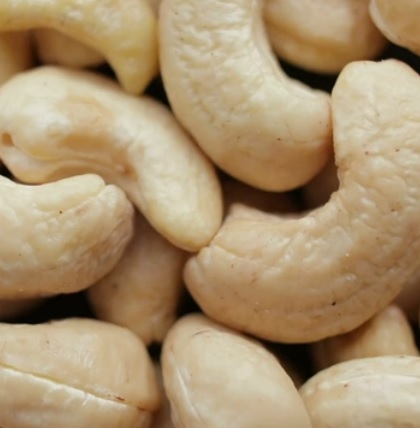Cashew flour is made by grinding cashews into a fine powder. It is a gluten-free alternative to traditional wheat flour and offers a subtly sweet, nutty flavor that enhances baked goods, sauces, and even meat coatings. Cashew flour is rich in nutrients and provides a number of health benefits, making it a popular choice for those on gluten-free, paleo, or grain-free diets. However, it is high in calories and may in some individuals sensitive to this nut, bring allergies or intolerances.
Nutritional Profile (per 100 grams).
- Calories Approximately 553 kcal.
- Protein About 18 grams, making it a good source of plant-based protein.
- Fat About 44 grams, predominantly monounsaturated fats beneficial for heart health.
- Carbohydrates About 30 grams, a significant portion of which is dietary fiber.
- Fiber About 3 grams, beneficial for digestive health and maintaining a feeling of fullness.
- Vitamins and Minerals Rich in magnesium, phosphorus, zinc, and iron, along with B vitamins.
Industrial Production Process
- Selection. The production of cashew flour begins with the selection of high-quality raw cashews. The cashews are carefully chosen to ensure they are free from impurities and in good condition.
- Cleaning. The selected cashews are cleaned to remove any residues or external impurities, ensuring that only clean cashews proceed to the next stage.
- Drying. The cashews may be lightly dried to reduce moisture content, facilitating grinding. This step is optional and depends on the specific process used.
- Grinding. The cleaned (and potentially dried) cashews are ground into a fine powder. Grinding must be performed in a way that preserves the nutritional profile of the cashews and achieves a uniform flour consistency.
- Sifting. The cashew flour is sifted to remove any coarse particles and ensure a uniform granule size of the final product.
- Quality Control. Before distribution, the cashew flour undergoes quality checks to ensure it meets standards for purity, flavor, and nutritional value.
Considerations
Cashew nut extracts have demonstrated positive properties for human health because they contain only the positive components, but this nut in its wholeness has some contraindications.
The FDA has not included cashews among the nuts approved for cardiovascular disease reduction because of their saturated fat content (1), and other studies have also not observed a positive influence of cashews (2).
Safety
Nut Allergies Individuals with nut allergies should avoid cashew butter.
Calories High in calories, so its consumption should be moderated, especially for those monitoring caloric intake.
References_____________________________________________________________________
(1) Baer DJ, Novotny JA. Consumption of cashew nuts does not influence blood lipids or other markers of cardiovascular disease in humans: a randomized controlled trial. Am J Clin Nutr. 2019 Feb 1;109(2):269-275. doi: 10.1093/ajcn/nqy242.
Abstract. Background: The US Food and Drug Administration (FDA) approved a qualified health claim for tree nuts and reduction of cardiovascular disease. However, cashews are excluded from that claim due to their content of saturated fats, which is predominantly stearic acid. Because stearic acid is neutral with respect to blood lipids, several studies have been conducted to test the effect of cashew nuts on blood lipids, and these studies have produced conflicting results....Conclusions: Consumption of 1.5 servings of cashew nuts/d, the amount associated with the FDA qualified health claim for tree nuts and cardiovascular disease, did not positively or adversely affect any of the primary risk factors for cardiovascular disease. This trial was registered at clinicaltrials.gov as NCT02628171.
(2) Naghshi S, Sadeghian M, Nasiri M, Mobarak S, Asadi M, Sadeghi O. Association of Total Nut, Tree Nut, Peanut, and Peanut Butter Consumption with Cancer Incidence and Mortality: A Comprehensive Systematic Review and Dose-Response Meta-Analysis of Observational Studies. Adv Nutr. 2021 Jun 1;12(3):793-808. doi: 10.1093/advances/nmaa152.
![]() Cashew Flour
Cashew Flour 

